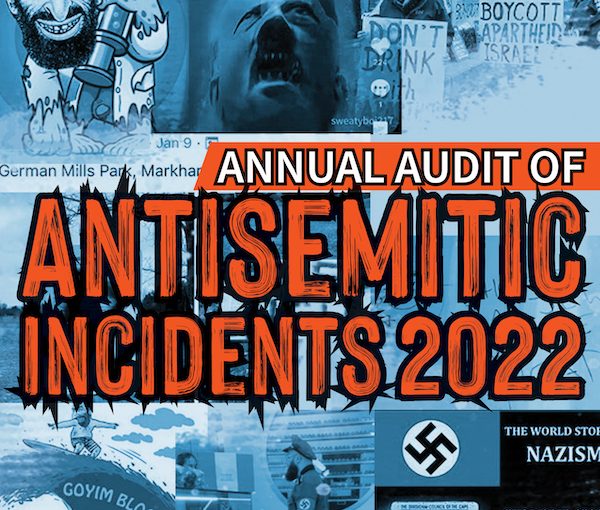Shai DeLuca and Alexandra Smith flew in Sunday from Toronto to address Vancouver’s weekly vigil for Israeli hostages on the six-month anniversary of the atrocities committed on Oct. 7. (photo by Pat Johnson)
Unity, defiance and determination were the overriding messages at the community rally Sunday, April 7, marking six months since the atrocities of Oct. 7.
“Our hearts are heavy with the weight of loss and sorrow,” said Michael Sachs, regional director of the Jewish National Fund of Canada. As Israelis were called up for service at the start of that war, another battle began in the diaspora, he said.
“Jews worldwide were drafted for a different, yet related, war,” said Sachs. “In the wake of Oct. 7, we witnessed a disturbing and radical rise in antisemitism and Jew-hatred right here in Canada.”
Canada today does not resemble the Canada of Oct. 6, he said, as anti-Jewish ideas and actions have “emerged from the alley and are now openly displayed on our streets and threatening the very fabric of our society.
“We should always draw strength from the resilience and courage of the survivors,” Sachs said. The souls of those murdered that day, he said, live on “in our commitment to build a world with compassion, justice, that will triumph over the cruelty and ignorance that we are seeing.
“The brave soldiers, of all faiths, who have made the ultimate sacrifice in defence of Israel – we mourn you and we will never forget you,” said Sachs.
The Jewish response to evil is goodness, he said.
“In the face of their darkness, let us shine our light on them by rejecting forces of division, and continue to embrace the power of the unity of our community and our amazing allies,” he said. “Let us stand together, hand in hand, to be the hope and strength to the families of those held hostage. Let us show the world that our Zionism – not the Zionism that they have created – our Zionism, our love of Israel, is stronger than any hate they can throw at us.”
Aron Csaplaros, BC regional manager of B’nai Brith Canada, recalled his own family’s history.
“For hundreds of years, we have overcome expulsions, pogroms, massacres,” he said. “During the Holocaust, my grandmother spent months hidden in a dark basement, constantly hearing the footsteps of Nazi officers walking above her head, knowing that she could be found and murdered at any minute. But she, like Jews have done throughout our history, survived. She is here today standing in the crowd and we, the Jewish people, are still here, stronger and more united in our resolve than ever.”
He reiterated the demand of the weekly events, that the hostages be released, and added that Hamas should accept its defeat and unconditionally surrender to facilitate a new era of peace between the Palestinian and Israeli people.
“We will never stop fighting those who wish to destroy us,” Csaplaros said. “And we will not stop fighting to defend our indigenous homeland, the land of Israel.”
Until the hostages are released, he said, “We will not stop rallying. We will not stop marching. We will not stop advocating and we will not stop calling on our elected leaders in government to act until every single one of our brothers and sisters held hostage is safely returned.”

Shai DeLuca, an interior designer who lives in Toronto and Israel, is a familiar face to audiences of Toronto’s CityTV and Global television. During the Hamas war in 2014, he pivoted to being a voice for Israel and has led battles against anti-Zionist campaigns in Toronto. He said he was nonchalant when he awoke to alerts on Oct. 7. But, as he and his husband took refuge in a shelter, he realized this was not routine.
“I have lived through enough attacks, hundreds upon hundreds of Hamas rocket attacks throughout my life, to know that this felt different,” said DeLuca.
Soon, Israeli phones were lighting up with push notifications, videos and images showing murder, rape and other atrocities.
“It was from numbers we did not recognize,” he said. “Only later did we find out that these were targeted push notifications from Hamas.”
Last week, DeLuca was back in Israel and visited the site of the Nova music festival, where hundreds were murdered. The site is about 15 minutes from his family home.
He spoke with Rotem, a young woman who had been a vocal advocate for reconciliation between Israelis and Palestinians. She had spent 30 hours in a safe room with her children before the terrorists gave up and sought out easier prey.
That day, Rotem told DeLuca, was “the day that I realized they really don’t care who we are.”
“A Jew is a Jew,” she told him. “They want us all dead.”
Many of Israel’s most avid peace activists lived on the kibbutzim that were attacked.
“The belief that one day we would have peace with our neighbours wasn’t something she could foresee anymore and that was heartbreaking to see,” said DeLuca. “She had strived to work toward a better tomorrow for all and was met with the worst massacre of the Jewish people since the Holocaust, on her community specifically…. A community that employed Gaza workers and worked daily to build bridges. That bridge no longer exists, she said, they torched it.”
Now, in the diaspora, Jews are faced with what DeLuca equates to the antisemitic marches of the 1930s and ’40s.
“We have never been able to depend on others,” he said. “Our history has proven that.… The difference today, unlike times past, is that we have our home to go to. While the hate marches we see repeatedly across cities and across countries call to deny the existence of the only indigenous home the Jewish people have ever known, they continue to prove why its existence is so very important.”
Alexandra Smith, director of End Jew Hatred Canada, came with DeLuca from Toronto on a delayed flight, arriving just in time for the event.
“Today, we are called upon not only to demand the immediate and unconditional release of those unjustly held, but to reaffirm our commitment to each other as members of a shared community, a shared nation, a shared destiny and, indeed, a shared humanity,” said Smith.
“Starting on Oct. 8, for many in the Jewish community, the open, brazen, unashamed Jew-hatred exhibited on college campuses and on our streets came as a terrible shock and a deep sense of betrayal,” she said. “But, for those of us who have been working in this space for a length of time, it came as no surprise. Antisemitism has always been there, only hidden under wraps. It took a war in the Middle East for it to rear its ugly head. It’s not an exaggeration to call this a profound crisis. In moments of crisis, however, the strength of a community is seen not only in its leaders but in the spirit of its people. Unity is our beacon of hope. Shoulder to shoulder, regardless of backgrounds, beliefs and life experiences, we embody the resilience that has helped communities throughout history overcome adversity.”
Rabbi Andrew Rosenblatt of Congregation Schara Tzedeck chanted El Moleh Rachamim, invoking the name of Elad Katzir, a hostage whose body was recovered by Israeli soldiers the day before the rally. Rabbi Susie Tendler of Beth Tikvah in Richmond said the prayer for the hostages.



